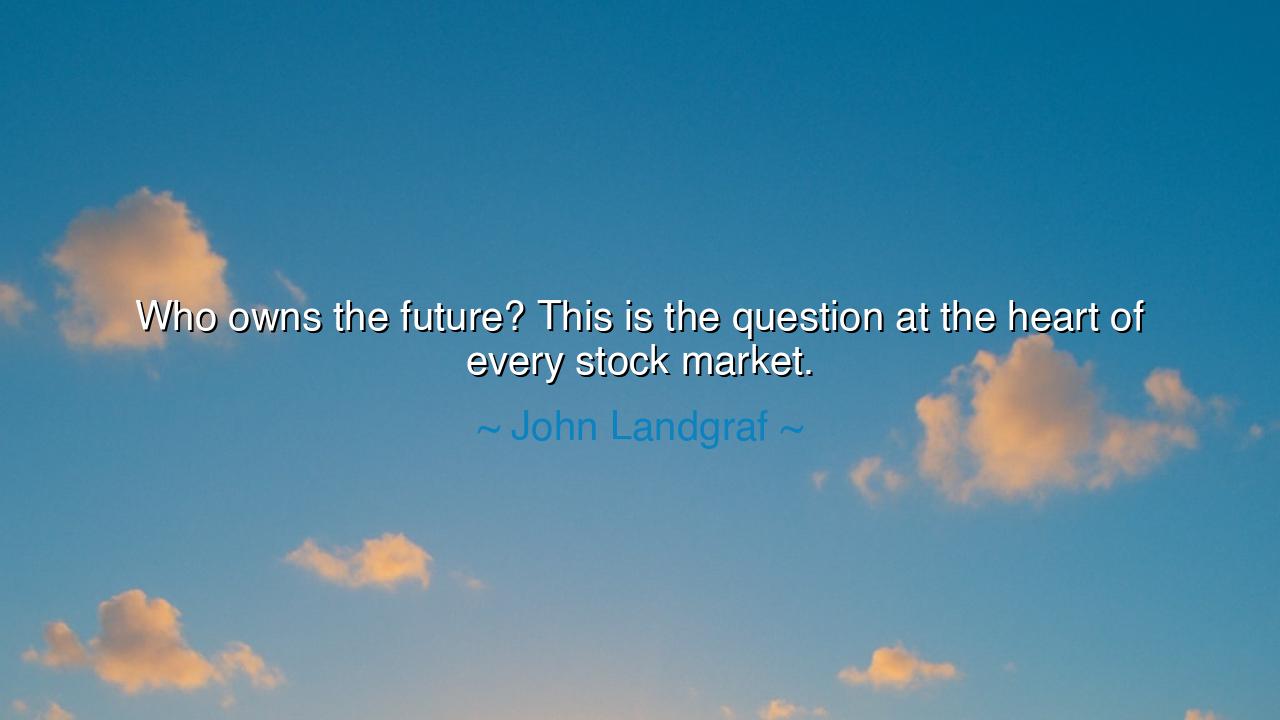
Who owns the future? This is the question at the heart of every






In the midst of the ever-turning wheel of time, the question “Who owns the future?” stands as a piercing call to the hearts of all who seek power, influence, and control. John Landgraf’s words, "Who owns the future? This is the question at the heart of every stock market," delve deep into the essence of power and ownership, particularly in a world governed by commerce, capital, and capitalism. In this world, the pursuit of wealth is not merely the accumulation of riches, but a contest to claim the future—to shape it, direct it, and use it to one’s advantage. Landgraf’s statement reflects the tension that has always existed between those who hold the resources of today and those who will define the path forward.
In the ancient world, this very question was raised, albeit in different terms. The city-states of Greece and the Roman Empire were driven by the struggle for dominance, not only in their time but in shaping the future. The great Alexander the Great sought not just to conquer lands, but to shape the world of tomorrow. His military conquests were not only about wealth, but about establishing an enduring legacy. To him, the future was something to be claimed—a world where his influence would echo through the ages. The same hunger for the future drove the Romans, who built roads and monuments that would endure for millennia, ensuring their dominance would persist long after their military power had faded. Landgraf’s insight that the question of “who owns the future?” lies at the heart of commerce is mirrored in these ancient empires’ drive to control not only the present but the legacy they would leave behind.
Socrates, too, was concerned with the nature of influence over time. Though not driven by material wealth, his concern was for the minds and souls of his fellow Athenians—he sought to shape the future by transforming the way people thought about virtue, truth, and justice. In his pursuit, he created a legacy of wisdom that has lasted for millennia. Socrates understood that the ownership of the future lies not just in material wealth, but in the ideas and values that guide society. The battle for the future, in this sense, is not simply a contest over resources but a battle for control over the minds and hearts of generations yet unborn.
As we move into the modern era, the dynamics of power have shifted, yet the essence remains the same. Capitalism has become the predominant system, where stock markets—the trading grounds of today’s rulers—have replaced the battlefields of antiquity. In the stock market, investors, corporations, and traders do not just trade commodities; they trade futures—bets on what the world will look like tomorrow. Companies like Apple, Tesla, and Amazon are not simply valued by their present revenues, but by their vision of the future. Investors do not buy shares in companies solely based on current performance but on the belief that those companies will lead and shape the future. The market, therefore, is not just about money—it is about control over the future itself, a game of predictions, influence, and power.
Consider the story of John D. Rockefeller, the founder of Standard Oil, who became one of the wealthiest men in history by dominating the oil industry. Rockefeller's empire was built on a keen understanding of the future—how oil would power the world for generations to come. He not only controlled the production and distribution of oil but also understood that controlling the supply meant controlling the future of industry, transportation, and even politics. His influence over the future was immeasurable, as he helped shape the global economy for decades. Like Rockefeller, those who control the resources of today—whether in energy, technology, or finance—hold the keys to tomorrow. The stock market, as Landgraf suggests, is a reflection of this battle for influence, for control over the unfolding narrative of the future.
The lesson that Landgraf’s words impart is a powerful one: ownership of the future is not just about having resources today, but about having the foresight, the vision, and the will to shape the world that is yet to come. Just as the great empires of the past fought for control over the future through conquest and culture, so too does the modern world fight its own battle for dominance through finance, technology, and influence. Those who can predict the future, those who can shape trends and direct the flow of capital, will hold the reins of tomorrow.
In practical terms, this means that we must not only pursue the wealth and resources of today but also cultivate the vision and foresight that will allow us to shape the future. Whether in business, innovation, or personal growth, we must think beyond the immediate horizon, recognizing that today’s choices create the foundation for tomorrow’s opportunities. The greatest minds, whether in the ancient world or today, are those who see the world not as it is, but as it could be—who dare to envision a different future and work relentlessly to make that vision a reality. Ownership of the future, then, lies in our ability to see ahead, to act with purpose, and to shape the world we leave to those who follow.






AAdministratorAdministrator
Welcome, honored guests. Please leave a comment, we will respond soon